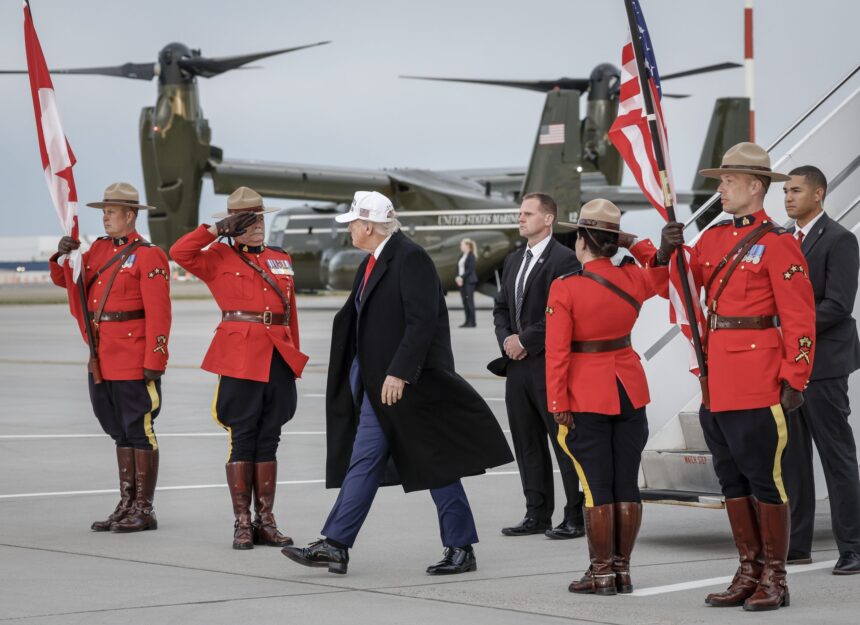The meeting rooms at the G7 summit in Sicily pulse with a mix of tension and nervous anticipation as Canada’s Prime Minister Mark Carney prepares for his first face-to-face encounter with former President Donald Trump since Carney’s election victory last February. This high-stakes diplomatic dance arrives at a crucial moment for transatlantic relations, with the spectre of trade disputes and climate policy divergence looming over the Mediterranean.
“We’re entering an era where personal relationships between leaders matter more than institutional frameworks,” explains Dominique Moisi, founding member of the French Institute for International Relations, whom I spoke with yesterday as delegations arrived at the coastal resort. “For Carney, establishing a working rapport with Trump may determine Canada’s economic trajectory for years.”
The dynamics couldn’t be more striking. Carney, the former central banker with his technocratic approach to governance, stands in stark contrast to Trump’s America First populism. While both leaders share backgrounds in business and finance, their visions for economic development and international cooperation diverge dramatically.
Canadian officials, speaking on background, reveal the meeting agenda centers on three contentious files: the renegotiation of critical minerals cooperation, NATO defense spending commitments, and the thorny issue of Arctic sovereignty that has intensified as shipping lanes open with accelerated ice melt.
“The Prime Minister is fully prepared to protect Canadian interests while finding areas of pragmatic cooperation,” said Foreign Affairs Minister Mélanie Joly in a press briefing at the Canadian embassy in Rome yesterday. This measured diplomatic language barely conceals the anxiety permeating Canadian policy circles.
From my position in the press area overlooking the summit venue, I can observe the careful choreography of advance teams preparing for meetings that will shape North American relations. Canadian officials dart between meeting rooms with briefing books, while their American counterparts maintain a more casual presence, reflecting perhaps the power imbalance between the neighbors.
Data from Statistics Canada shows the vulnerability in this relationship – 75% of Canadian exports still flow to the U.S., despite years of diversification efforts. The Trudeau government’s trade tensions with Trump 1.0 cost the Canadian economy an estimated $3.2 billion according to research from the C.D. Howe Institute, a wound still fresh in the minds of Canadian manufacturers.
“Carney understands the economic interdependence better than most,” says Laura Dawson, former director of the Wilson Center’s Canada Institute, whom I reached by phone from Washington. “His background at the Bank of England and the Bank of Canada gives him unique credibility on international economic issues, but Trump respects power more than expertise.”
The summit comes amid shifting global economic alliances. The International Monetary Fund‘s recent World Economic Outlook highlights growing fragmentation in global trade, with regional blocs strengthening at the expense of multilateral cooperation. Canada finds itself caught between its traditional American partnership and expanding economic ties with Europe and the Indo-Pacific.
Walking through the seaside village adjacent to the summit yesterday, I encountered small groups of protesters holding signs condemning “climate criminals” – a reference to both leaders’ support for fossil fuel development. Carney’s environmental credentials, once strong during his tenure as UN Special Envoy on Climate Action and Finance, have been tested by his government’s approval of new LNG terminals in British Columbia.
Trump’s withdrawal from the Paris Climate Agreement during his first term, and his promises to expand American oil and gas production during the campaign, create an uncomfortable backdrop for discussions on environmental cooperation. Yet diplomatic sources suggest both leaders see opportunity in collaboration on nuclear energy expansion and critical minerals development.
“We’re watching a fundamental reshaping of the international order,” explained Antonio Garza, former U.S. Ambassador to Mexico, who is in Sicily for parallel business discussions. “Canada’s ability to navigate these waters depends on Carney’s capacity to speak Trump’s language without sacrificing Canadian sovereignty.”
The meeting occurs against a backdrop of European anxiety about American commitment to NATO. Trump’s previous criticism of allies’ defense spending has sharpened since his election victory, with specific demands for Canada to double its military budget to meet the 2% of GDP target. Carney’s government has committed to gradual increases but faces fiscal constraints after inheriting substantial deficits from the Trudeau era.
Beyond the bilateral dynamics, this G7 Summit marks the first major test of Carney’s international leadership. The Prime Minister arrived with ambitious proposals for global financial reform drawing on his central banking experience, but these may be overshadowed by the immediacy of managing the Canada-U.S. relationship.
“Every Canadian leader eventually faces this moment of truth with an American counterpart,” notes Stephen Clarkson, political economist at the University of Toronto. “What’s unique about this encounter is that both leaders understand financial markets in ways their predecessors often didn’t.”
The stakes extend beyond bilateral relations. With Mexico’s recent leftward political shift under President Claudia Sheinbaum, North American economic integration faces its most significant challenge since NAFTA’s inception. Canadian officials hope Carney can position the country as a stabilizing force within the continent.
As delegations begin formal sessions today, the personal chemistry between Carney and Trump will be scrutinized by diplomats and markets alike. Whether they can forge a pragmatic partnership despite ideological differences may determine not just Canada’s economic future, but the resilience of the rules-based international order that both the G7 and Canada have championed for decades.






